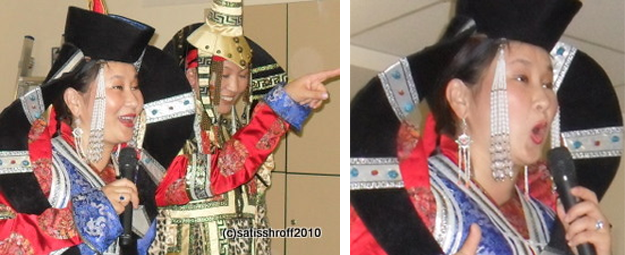Tuesday evening we were gathered in the music room of the Schauinsland school to practice our regular singing. There we were, old and young members of the Männergesangsverein Kappel, doing our pre-singing exercises with our larynx, trying to get the ‘r’s and ‘ch’ and ‘st’ sounds sung in unison through the guidance of our pianist and conductor Johannes Söllner. He’s a young man with a close shaved, bespectacled and teaches music and mathematics at a Freiburger school.
Suddenly there was a knock on the door and three Mongolian ladies came in. I remember Dirk had mentioned something about a surprise earlier. It was a mother and her two lovely daughters. After the round of introductions performed by Dirk Schneider who wears a small pair of glasses on his oval, fleshy face and grows grapes and sells good wine with his dad, we came to know one of the daughters was living in Freiburg since three years and works at the German-Mongolian Centre, where she sings and conducts a Mongolian choir. Her name was Badamkhorol Samdandamba and her sister Bat-otgou, who was a model from Ulan Bator and organises fashion shows in Germany and Mongolia. Ulan Bator is the capital of the Mongolian People’s Republic, a stock-raising region with woollen gods, saddles, knitwear and railway links to China and Russia.

The slender, elderly mother’s name was Lkhundev Gonjiv and her birthplace was Hovd in the Gobi-Altai, a country of steppes and stony, sandy desert, crossed by the Kalgan-Ulan Bator highway, rich in silver and mercury and the centre of the Russian atomic industry at Ust Kamenogorsk. The whole family loved singing.
The ladies were delighted to listen to us that evening as we went about learning our repertoire for the next concert. When men sing unisono in a strange tongue, namely German, it must sound strange to Mongolian ears. After that the ladies treated us with songs from Mongolia. The first song was about the Black Mountains of Mongolia, a solo by the mother, which evoked images of a nomad tent in the vast grasslands. The song didn’t have a rhythm but was sung as a long monologue. It was about a young hunter from the Black Mountains praising the beauty of the mountains, the cuckoo, similar to the ones in the Schwarzwald. The refrain went thus:
Young man,
You have a good character,
You are brave,
Remain so.
The sky is lovely,
But when it’s cloudy,
One can see your character,
Through the dark clouds.
The second song was short with the title ‘Mananthayo’ sung by the two daughters: beautiful teeth, long black hair, high cheek bones, wearing modern casual clothes. It was a love song:
I’m ready
So decide
What you want
The third song conjured up images of the vast Steppe and Mongolian horses galloping in free dom. We, the singers of the Männergesangsverein were obliged to sing the refrain of the hoofs of the horses in Mongolia with ‘Tauer! Tauer! Tauer!’ I must admit it was a jolly good Mongolian-German cultural cooperation.
The Männergesangsverein sang impromptu: ‘O Du Mädchen von Lande.’
The guests from Mongolia tallied with a song by Madame Lkhundev Gonjiv:
O you look so handsome,
When you walk.
On horseback
You appear like a hero.
I shall make a coat
For you,
That smells good,
Will love you forever.
Since her mother and sister didn’t speak German, Badamkhorol spoke with us and translated. We thanked them with two German songs: Erhebe das Glas (Raise your Glass) thereby proposing a toast with Dr. Schneider’s good Badische wine, and the other song was ‘Sänger sollen Freunde sein’ (Singers should be Friends). The lyrics seemed to suit the occasion.
Badamkhorol mentioned that on Saturday afternoon at St. William’s Valley (4pm) there’s a big drum festival. A famous Mongolian shaman had come to this valley and had found out that the place had strong magical powers. The shaman had carried out a ritual ceremony and had summoned the Schwarzwald spirits and since then they help the people. The shamans in Mongolia are traditional medicine men (like their counterparts in the Himalayas) who use their healing arts to work cures and protect the people from the village from evil influences. The shaman wears special garments to show authority and performs his ritual ceremonies with magical incantations, trances and exhausting dances. Before the shaman drinks or eats during the ceremony, he always gives a portion to the spirits that are prevalent in the environment where he or she is healing. This is precisely what a shaman in the Himalayas does, as well as the practicing Hindus in Nepal and India.
The MGV is planning a programme with traditional German songs (Liederabend) accompanied by folksongs from Mongolia, Togo and Nepal. It goes to show that the verein is going with the times, thanks to the new chairman Klaus Sütterle, who’s open to new ideas and impulses in his bid to increase the membership and to set forth the old tradition of the Lieder.
